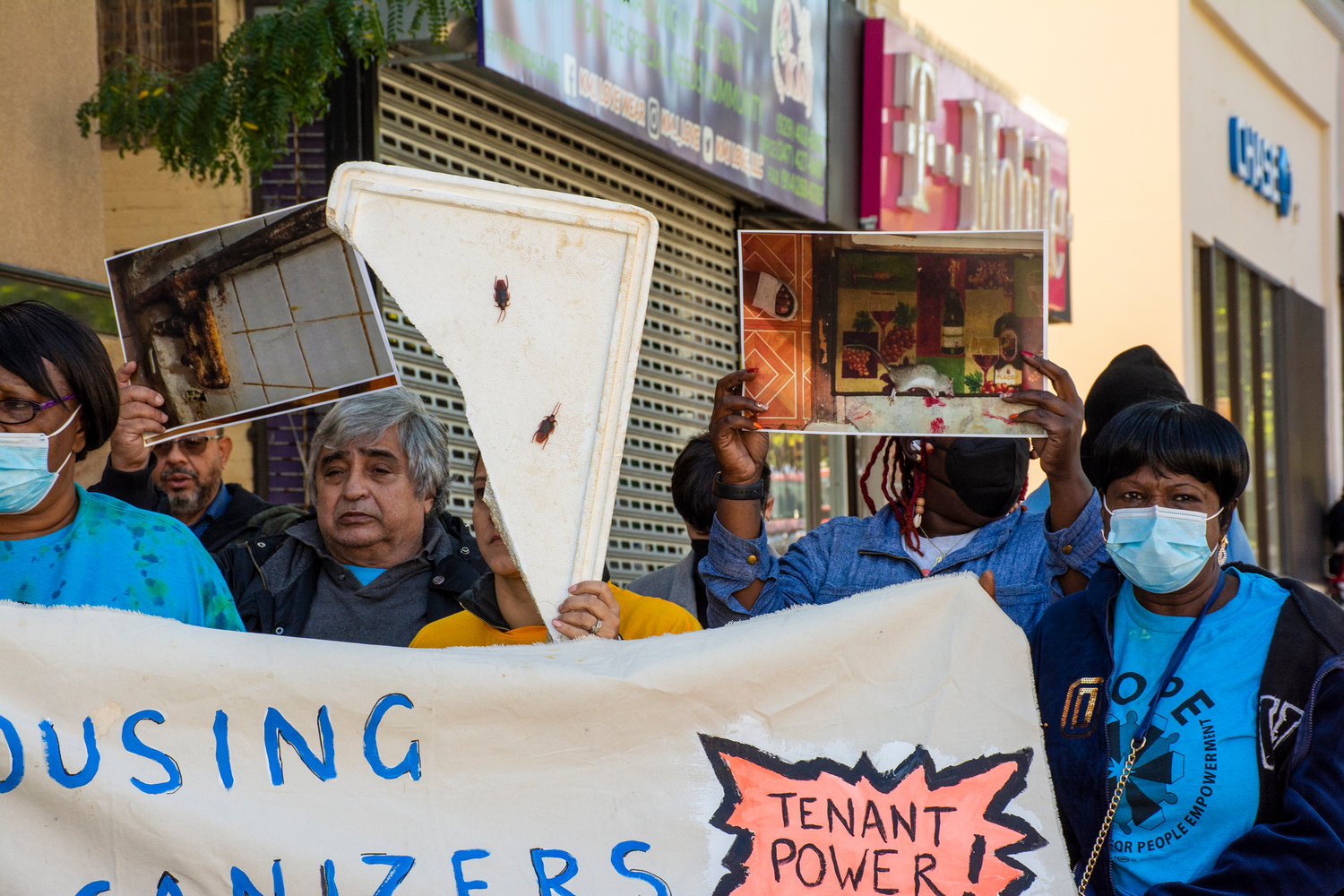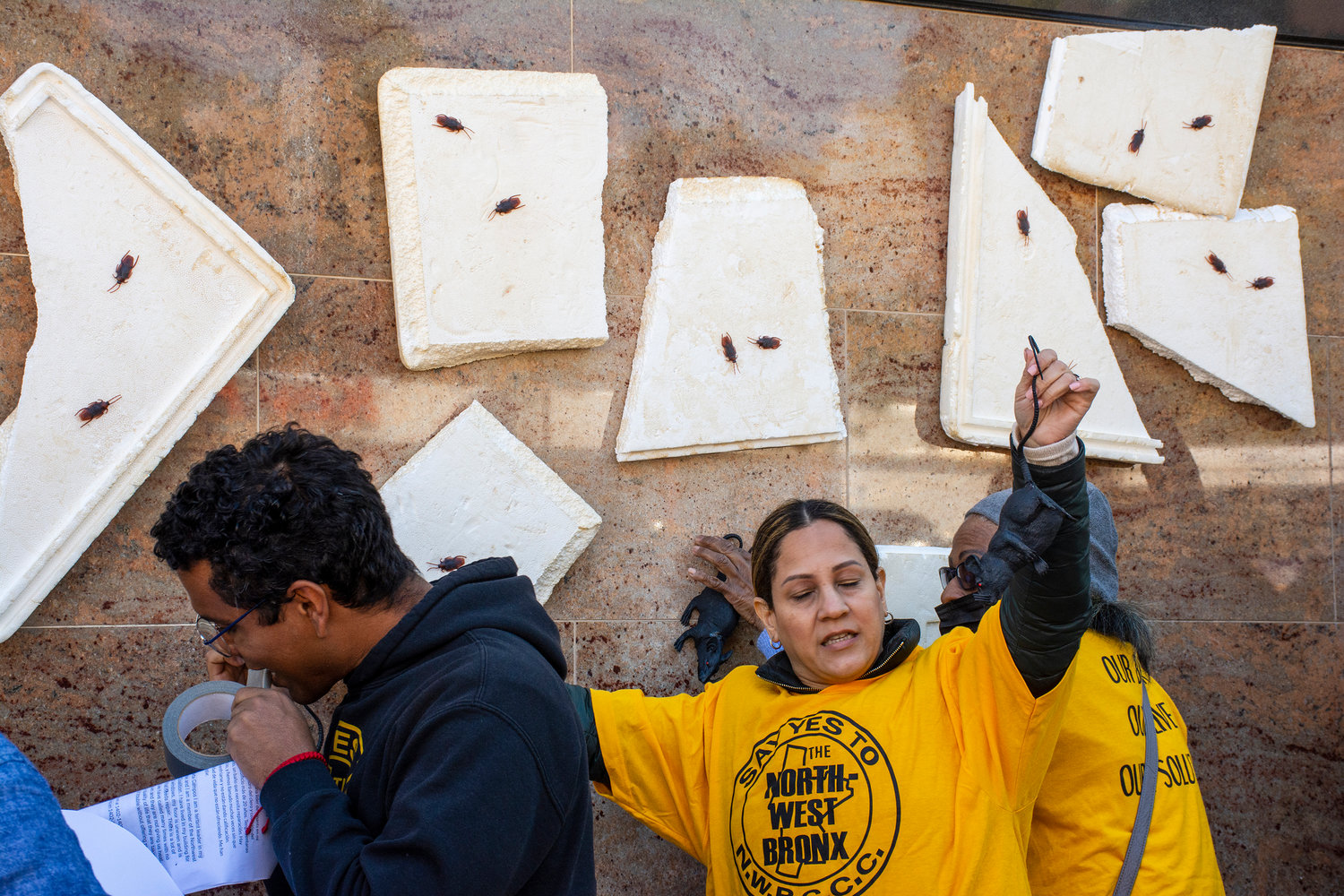Tenants tell landlord they’ve had enough
Crowd gathers outside of Chestnut Holdings offices in North Riverdale to protest
They traveled from Bedford Park, Fordham, and even as far away as Crown Heights in Brooklyn. They might be from different communities, but they all have something in common: their landlord is Chestnut Holdings.
Their destination last week was Chestnut’s North Riverdale headquarters — a building they decorated with plastic rats and roaches, an act of defiance to draw their landlord’s attention to the deteriorating condition of their own buildings.
The command center of Jonathan Wiener’s 25-year-old real estate investment firm is located across the hall from offices leased by The Riverdale Press in a placid four-story building on Riverdale Avenue. It manages some 6,000 apartments across 134 residential buildings in the Bronx, Brooklyn and Manhattan.
At least three are located within Community Board 8, and the governmental advisory group itself is a leased tenant of Chestnut’s North Riverdale offices.
The firm has a spotty track record complying with New York’s housing standards, according to public documents and court records. They agreed to pay $300,000 last year to settle a lawsuit with state Attorney General Letitia James after an investigation concluded Chestnut Holdings falsely certified apartments as safe from lead paint in new leases, and failed to inspect for lead in units where young children lived.
Assemblyman Jeffrey Dinowitz applauded the settlement announcement at the time, calling the violations “unacceptable.”
The firm “put hundreds, if not thousands, of families at risk of lead poisoning,” he added.
Tenants occasionally trek to North Riverdale to visit Chestnut’s suite, typically by appointment. It isn’t listed in the building’s ground-floor directory, so confused visitors sometimes wander the halls looking for help.
When a group of about two dozen tenants and organizers from the Northwest Bronx Community & Clergy Coalition arrived at the doorstep Oct. 6 with a list of urgent repairs, the building’s custodial staff told them Chestnut’s office was closed.
So they delivered their message from the street.
They taped photos of leaks, mold and vermin to the tile façade of the 5676 Riverdale Ave., structure, depicting a few of the hundreds of open violations documented by city inspectors in their buildings.
“Since we cannot get access to their office, we are going to leave a little symbol for them so they can get the message,” said Yohanny Escano, a tenant at 2700 Grand Concourse. Chestnut Holdings purchased the 66-unit rent stabilized building in 2008 for $6.6 million.
“Ever since then, the building has been deteriorating,” Escano added. “The issues range from leaks to collapsed ceilings, plumbing issues and structural issues. The list goes on.”
Repeated repairs requests have gone unanswered, she said, while others are addressed only cosmetically.
Linda Peterson, who lives at 2170 University Ave., said no one makes repairs or cleans her building on a regular basis.
The super “wears more paint and plaster on his clothes than he puts on the wall,” she said.
“I always pay my rent, but my building is still messed up,” Peterson said. “We never get a response from Chestnut Holdings.”
Tenants at Peterson’s building are petitioning a judge to force the landlord to address pest infestations, secure the building’s lobby, and make the entrance accessible to people with disabilities. More than 225 open housing violations exist at the address, down from 243 in April when tenants and The Legal Aid Society filed the case in housing court.
Chestnut Holdings field supervisor Cesar Morales, who is a respondent in the case, listened furtively from the sidelines of the demonstration last week, then approached and introduced himself.
He accepted the tenants’ demand letter, and in a conciliatory tone said, “I promise I will go back to the building and take a look.”
Jordan Tapia, a partner at Moss and Tapia who legally represent Chestnut Holdings in the University Avenue case, said not all of the tenants in the building are participating, and many of the requests are recurrent. She said the firm is working with tenants to schedule repairs in each unit, but there have been delays because tenants are denying access to their apartments.
“Frequently when we’re in court, it’s very hard to get access,” Tapia said. “The general standard is that as long as the landlord gets access from 9 a.m. to 12 p.m., then they’ll have the whole day to work. I don’t know why these tenants are denying access.”
But that’s not what’s happening, said Benjamin Seibel, a Legal Aid attorney representing the tenants.
“There’s been a tremendous amount of delay on this case,” he said. “This is a tactic. There are many moving parts, but I would say Chestnut Holdings and their lawyer have not meaningfully been involved in setting up access.”
Judges can impose civil penalties when landlords fail to meet deadlines set in housing court. That clock will begin ticking after the two sides agree to a timeline or get a judge’s order.
This particular case is part of Legal Aid’s group advocacy practice, Seibel said, which focuses on renters seeking relief from hazardous conditions and tenant harassment.
“There’s a lot of power in groups of tenants coming together,” he said. “Mice are rarely in one person’s apartment. Big professional landlords should be able to follow the law and not allow violations to pile up. They have the resources. This is what they do professionally.”
Other Chestnut Holdings tenants are considering rent strikes to pressure the company to make repairs at 2700 Grand Concourse, 1402-8 Sterling Place, and 1742-6 Union St. Rent strikes are a riskier method and can trigger landlords to begin eviction filings for non-payment.
Still, “withholding the rent can give tenants negotiating power,” Seibel said. “The key is to hold the rent and put it in a safe place such as a bank account. If tenants are trying to use rent that they have withheld as leverage but are not actually saving it, that will be a problem.”
Tenants at 2700 Grand Concourse listed their demands in an Oct. 6 letter asking for a response within 10 days. There are 21 items included, ranging from specific issues like a broken door, trash in the yard, and exposed wires, to building-wide problems like collapsing ceilings and mold and fungus.
They also want the building super to be more responsive, and would like a better way to request repairs in the first place.
“We hope we can work together amicably to resolve these problems without resorting to litigation,” they wrote.
For their part, Chestnut Holdings says they will continue to address issues in their buildings as they arise. Northwest Bronx organizers were reporting violations to the city on behalf of tenants and “instructing tenants not to provide access so that we can complete repairs,” a company spokesperson wrote in an email to The Press.
“We take the conditions of our buildings very seriously,” the spokesperson said, and consistently provide excellent quality housing to all tenants.”










